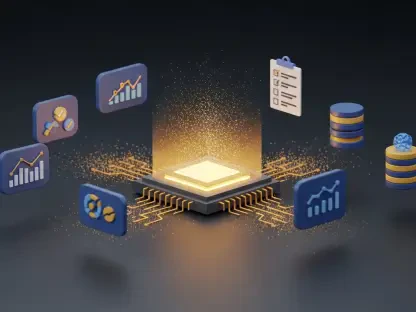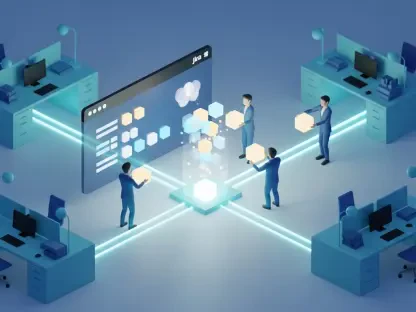The advent of generative AI (genAI) tools has sparked a significant transformation in how knowledge workers operate. Tools like ChatGPT and Copilot promise remarkable efficiency gains, yet they also raise concerns about the potential decline in critical thinking and problem-solving skills. This dual impact has spurred much discussion and research. The study conducted by Carnegie Mellon and Microsoft delves deep into this evolving paradigm, exploring the balance between efficiency and cognitive decline, the phenomenon of cognitive offloading, and the broader implications for human cognition.
Efficiency vs. Cognitive Decline
As generative AI finds its way into workplaces, it brings undeniable improvements in productivity. By automating mundane tasks and providing rapid access to information, genAI tools enable workers to complete their duties more swiftly and with seemingly greater precision. However, this newfound efficiency is not without its drawbacks. The dependency on AI for solutions may lead to a reduced engagement in critical thinking and problem-solving, essential cognitive processes that drive innovation and personal growth.
The Carnegie Mellon and Microsoft research underscores this dichotomy. As knowledge workers shift tasks to the AI, they may lean more on the technology to handle complexities they previously tackled themselves. This passive reception of AI-generated content can culminate in a diminished capacity for independent critical analysis and problem resolution. Over time, the continuous reliance on genAI might erode the very skills that once set these workers apart, potentially leading to long-term cognitive implications.
The Role of Cognitive Offloading
Cognitive offloading, a concept where individuals use external tools to lessen their cognitive load, is rooted in human history. For centuries, people have relied on devices like calculators, notes, and reference materials to aid in daily tasks. Yet, the rise of generative AI represents a quantum leap in offloading efficiency. The concern here is that this offloading now includes core cognitive tasks—such as analysis, synthesis, and evaluation—that were traditionally within the human domain.
By delegating these essential activities to AI, there is a risk of undermining fundamental abilities. The research highlights that while AI can effectively handle many tasks, a reliance on such tools may lead individuals to lose the knack for performing these independently. Workers might become reliant on AI for nuanced judgment calls and complex problem-solving, which could blunt their cognitive agility over time. The study suggests a balanced integration where AI acts as an enhancer, not a replacer, of human cognitive functions to avert these risks.
Observations in Educational Contexts
Generative AI’s impact extends beyond the workplace and into educational environments. A notable example comes from Professor David Raffo’s classroom observations over six years. Raffo documented a troubling decline in students’ writing abilities, which curiously reversed during the COVID-19 pandemic. This sudden improvement led to suspicions that students might be leveraging genAI tools to complete their assignments, bypassing genuine learning processes.
This example underscores a significant concern regarding genAI: over-reliance on these tools in education could thwart the development of crucial communication and critical-thinking skills. If students turn to AI to craft their essays or solve complex problems, they might miss out on deeply engaging with the material themselves. This detachment poses a long-term threat to their academic growth and professional competence, raising an alarm for educational institutions to strike a balance between leveraging AI benefits and fostering innate skill development.
Rewiring Human Cognition
Traditionally, technological advancements have reshaped human cognition. The integration of genAI tools into daily workflows underscores the “use it or lose it” principle. When humans shift even fundamental tasks to AI, there is a risk of cognitive stagnation or atrophy. A growing dependency can lead to a diminished ability to independently perform tasks that once required deep thought and decision-making.
Industry observers like Jack Gold highlight the dual-edged nature of technological evolution on human thinking. While AI offers unprecedented convenience and efficiency, it can also rewire human cognitive patterns either positively or negatively. Ensuring that this cognitive rewiring enhances rather than diminishes essential cognitive functions requires a thoughtful, strategic approach to AI integration. Recognizing and mitigating potential negative impacts becomes paramount to fostering a future where human cognition evolves synergistically with technological advancements.
Positive Applications of genAI
Despite the potential risks, there are also positive outcomes from the judicious use of genAI, particularly in educational settings. In regions like Nigeria, AI tools have been effectively used to bolster educational results. AI tutors, for instance, have demonstrated the potential to significantly enhance student learning outcomes, showcasing genAI’s ability to support human cognition positively when thoughtfully integrated by educators.
This positive application suggests a paradigm where AI tools can be used to complement and bolster human efforts rather than replace them. By providing guided assistance and personalized learning experiences, AI can help students achieve remarkable progress. It is essential to focus on designing and implementing AI that augments human critical thinking and problem-solving abilities, ensuring that the use of genAI fosters cognitive growth and doesn’t lead to redundancy in essential skills.
Recommended Practices for AI Usage
Balancing efficiency gains with cognitive skill preservation calls for a strategy that promotes active verification and critical engagement with AI-generated content. Organizations should train workers to critically evaluate and thoughtfully integrate AI outputs. By doing so, they ensure that workers remain active participants in their cognitive processes rather than becoming passive receptors of AI content.
In educational institutions, fostering environments that encourage students to engage with AI tools under guided supervision is crucial. Educators must oversee the balance, helping students leverage AI benefits while also preserving and enhancing their critical thinking and problem-solving skills. This holistic approach can lead to enhanced productivity without compromising personal cognitive development.
Conclusion
The arrival of generative AI (genAI) tools has caused a significant shift in the way knowledge workers function. Tools like ChatGPT and Copilot offer promising efficiency improvements but also bring concerns about the potential decline in critical thinking and problem-solving abilities. This dual impact has sparked ongoing discussions and research efforts. A study conducted by Carnegie Mellon University in collaboration with Microsoft delves into this changing landscape, examining the balance between increased efficiency and the risk of cognitive decline. The study also explores the concept of cognitive offloading, where individuals rely on AI tools to handle cognitive tasks, and the broader implications for human cognition. As genAI tools become more integrated into daily operations, it’s crucial to understand their impact on our cognitive processes and to find a balance that maximizes efficiency without sacrificing essential cognitive skills. This research is vital in guiding how we integrate AI into the workplace in ways that support human intelligence and ingenuity, ensuring that we harness these tools for progress while maintaining robust cognitive capabilities.









